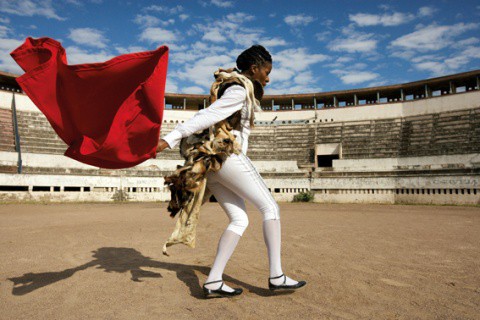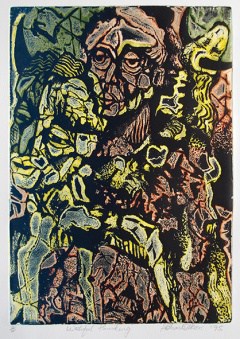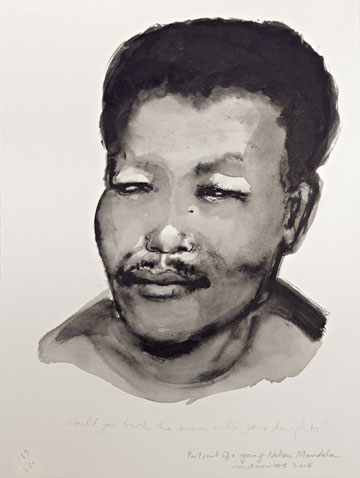Magubane will be in illustrious company in New York on the evening of Monday, May 10, when the ICP honours the nine recipients of the 26th annual Infinity awards, the country’s leading awards for excellence in the field of photography.
The ICP says it is an opportunity to “acknowledge some of
those image-makers whose work has allowed us to see the world anew, and
that enables us to better grasp the richness and diversity of our
common humanity”. Praising the winners’ contribution to the
photographic medium, ICP Ehrenkranz Director Willis E. Hartshorn sais,
“They share a commitment to the overarching power of photography and
how it can express what is both enduring and new in the human
condition. Whether documenting significant historical and contemporary
events, shedding light on the dynamism of unfamiliar cultures, or
extending the languages we use to describe and better understand who we
are, they have provided us with opportunities to re-grasp and
re-envision our world.” Peter Magubane is to receive the
Cornell Capa award (named after the famous photographer and founder of
Magnum). The Lifetime Achievement award is being made to famous photo
editor John G. Morris. Other winners are Gilbert C. Maurer/Hearst
corporation (ICP trustees award); Raphaël Dallaporta (young
photographer); Luc Sante (writing); Looking In: Robert Frank’s “The
Americans” by Sarah Greenough (publication); Lorna Simpson (art); Reza
(photojournalism) and Gentlemen of Bacongo by Daniele Tamagni (applied
photography). ICP’s ongoing mission is to present and champion
the variety inherent in the photographic experience. The Infinity
awards, first presented in 1985, were created to recognize the
contributions of influential photographers and emerging young talent.
This program attracts an audience of more than 700 prominent guests
annually from the photography, art, and fashion worlds. It celebrates
an international group of accomplished individuals who are receiving
what is widely recognized as the most coveted honour in photography.
Recipients are chosen by a jury from submissions compiled by a changing
international nominating committee. The Lifetime Achievement
award and Cornell Capa Award honourees are selected by the ICP board of
trustees, president’s council, and senior staff. The Trustees award is
periodically given by the board for outstanding contributions to the
field. The 2010 selection committee comprised publisher Chris Boot,
Carol McCusker of the museum of photographic arts, San Diego, and Peter
MacGill, president of the Pace/MacGill gallery in New York. Past
winners of the top awards have included Robert Frank, Mary Ellen Mark,
Marc Riboud, André Kertész, Henri Cartier-Bresson, Berenice Abbott,
Richard Avedon, Harold Evans, Bernd and Hilla Becher, Alexander
Liberman, Gordon Parks, Helen Levitt, Annie Leibovitz, Lee Friedlander,
William Klein, Susan Meiselas, Roy de Carava, Malick Sidibé, and Karl
Lagerfeld. Peter Magubane was born in 1932 in Vrededorp and
grew up in Sophiatown in the suburbs of Johannesburg, South Africa.
First published in Drum magazine in 1954, Magubane covered many
important political events in the 1950s, including treason trials and
demonstrations. After freelancing in London in the early 1960s, he
returned to South Africa and worked for the Rand Daily Mail from 1967
until 1980. From 1969 to 1976, Magubane was repeatedly
arrested and interrogated for his activities, jailed or kept in
solitary confinement for months at a time, and banned from his position
at the Rand Daily Mail for five years. In 1976, he was hospitalized
after his nose was broken by the police and his house was burnt down.
In 1985, he was shot seventeen times at a student’s funeral in
Natalspruit. His coverage of the uprisings in Soweto (June
1976) brought worldwide acclaim and led to a number of international
photographic and journalistic awards, including the American National
Professional Photographers Association Humanistic award in 1986, in
recognition of one of several incidents in which he put his camera
aside and intervened to help prevent people from being killed. From
1978 until 1980, Magubane worked as a correspondent for Time magazine,
after which time he moved to New York. Magubane has
photographed for several United Nations agencies, including the High
Commission for Refugees and UNICEF, and his photographs have appeared
in The New York Times, Life, Time, Newsweek, National Geographic, Paris
Match, and The Washington Post, among others. His honours include the
Missouri Honor Medal for Distinguished Service in Journalism from the
University of Missouri (1992) for his lifelong coverage of apartheid,
the Robert Capa Award (1986), and Lifetime Achievement Award from the
Mother Jones Foundation (1997). He has received honorary doctorate
degrees from several universities in South Africa and will be awarded
an honorary doctorate from Columbia University in New York in 2010.



